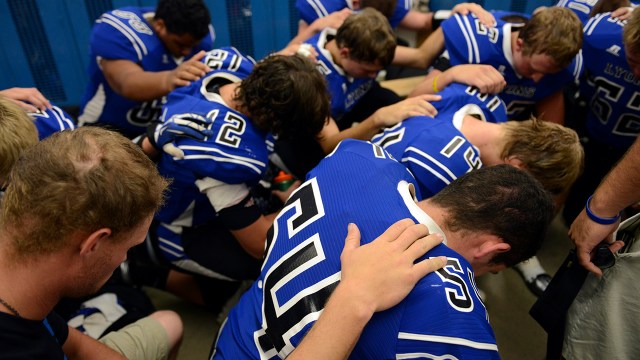Founded by Christians, America has become the greatest, most powerful, prosperous, blessed nation in the history of the world.
By 1892, the Supreme Court of the United States still considered America to be a "Christian nation" in their ruling on the case," Holy Trinity v. United States."
Now, Pew Research says, "Religion in public schools has long been a controversial issue."
And a Democrat presidential candidate has vowed this weekend to "revoke the tax-exempt status of churches that oppose same-sex marriage" if elected.
This is a time to be informed, vigilant and a time to take a stand.
America's founding was Christian. Even Christopher Columbus's expedition asked for God's assistance.
When President Obama infamously declared "we're no longer a Christian nation," he was acknowledging that America "was" a Christian nation.
In the 1892 Supreme Court case, "Holy Trinity v United States," the Court made it abundantly clear that they believed the US was a religious--- a Christian nation.
Today, on Columbus Day, we should be reminded that the commission to Christopher Columbus said in part, "It is hoped that by God's assistance some of the continents and islands in the ocean will be discovered..."
The first colonial grant made to Sir Walter Raleigh in 1584---a grant authorizing him to enact statutes for the government of the proposed colony, provided "that they be not against the true Christian faith..."
The first charter of Virginia, granted by King James I in 1606, says: "in propagating of Christian Religion to such people as yet live in Darkness..."
The celebrated compact made by the Pilgrims on the Mayflower in 1620: "Having undertaken for the Glory of God, and advancement of the Christian faith...a voyage to plant the first colony in the northern parts of Virginia..."
The fundamental orders of the founding of Connecticut made this declaration:
"And well knowing where a people are gathered together the Word of God requires that to maintain the peace and union...there should be an orderly and decent government established according to God...to maintain and preserve the liberty and purity of the gospel of our Lord Jesus which we now profess...of said gospel is now practiced among us."
The Declaration of Independence made this declaration: "We hold these truths to be self-evident, that all men are created equal, that they are endowed by their Creator with certain unalienable Rights..."
Justice Brewer, after reciting them, said: "Christianity, general Christianity, is, and always has been, a part of the common law...not Christianity with an established church...but Christianity with liberty and conscience to all men."
The religious liberty our founders sought, is again being challenged.
A Pew Survey published last Friday begins with,
"Religion in public schools has long been a controversial issue. The polling company mentions coach Kennedy from Bremerton, WA., who was fired for praying after games on the edge of the field. They note that this year the Supreme Court declined to hear the case.
Pew sampled 1800 youth between 13 and 17 years of age.
They found that "about 4 in 10 teens who attend public school say they commonly (either often or sometimes) see other students praying before sporting events at school. This includes about half of teenage public schoolers who live in the South, where students are more likely than those in other regions of the US."
About a quarter of teens say they often or sometimes see students invite other students to religious youth groups or worship service.
While overall most American teens --- 64%, say they rarely or never discuss religion with their friends, evangelical Protestants are much more likely than others to engage in sharing their faith.
I find this encouraging. Roughly 60% of "evangelical" teens say they talk to their peers about their faith. Unfortunately, only 40% of mainline Protestant youth and 20% of Catholic youth share their faith with their friends.
This Pew Report is extensive, with a great deal of profiles and facts, but the bottom line becomes apparent, as PEW begins to summarize.
Pew notes the issue surrounding coach Joe Kennedy from Bremerton and a Middle Tennessee school district that came under fire after an atheist group lodged a formal complaint accusing educators of violating the US Constitution when they allowed two student-athletes to be baptized on the school's football field in front of teammates.
The point of the spear pointed at religious liberty, however, is found in a case against Young Life.
In September a Young Life national Christian group was denied recognition as an official student group at North Carolina's Duke University because it bars members of the LGBTQ community from holding leadership roles.
PEW concludes: "Where exactly to draw the line between constitutionally protected religious activity and impermissible state-sponsored indoctrination remains under dispute.
"The line" will be drawn as far to the Left as evangelical Christians allow it to be drawn, because the line isn't real.
The entire separation doctrine surrounding Thomas Jefferson's words assuring the Danbury Baptists that the government is restrained by a wall from inserting itself into the affairs of the church, has been turned on its head and said to mean something Jefferson and the other Founders never intended.
And Jefferson assured the Baptists, there will be no official government religion or church---like they had experienced in England.
More than "separation activists", the greatest threat today to religious liberty is the LGBTQ activists.
The Dallas Morning News reported that presidential candidate Beto O'Rourke told the CNN audience last week that if elected he would "revoke the tax-exempt status of churches that oppose same-sex marriage."
Don Lemon, with CNN, asked O'Rourke: "Do you think religious institutions like colleges, churches, charities---should they lose their tax-exempt status if they oppose same-sex marriage?"
O'Rourke responded, "Yes"---the crowd erupted with applause.
The candidate said,
"There can be no reward, no benefit, no tax break for for anyone, or any institution, any organization in America that denies the full human rights and the full civil rights of every single one of us."
He added, "So as president, we're going to make that a priority and we are going to stop those who are infringing on the rights of our fellow Americans."
On Saturday evening, President Trump was speaking at a Values Voters Summit in DC where he told those in attendance that O'Rourke is a "wacko." And promised, "I will never allow the federal government to be used to target, harass or punish communities of faith."
I believe Trump will keep his word, but the fact that a top tier Democrat candidate would make that statement on live television is concerning.
Beto won't be the Democrat nominee for president. He was trying to get attention and was pandering to the homosexual community---who supports Buttigieg, but his words define just how far to the Left they are attempting to move the "line."
Takeaway.
When President William Henry Harrison died in office, the next President, John Tyler, declared a National Day of Fasting. On April 13, 1841, Harrison proclaimed,
"When a Christian people feel themselves to be overtaken by a public calamity, it becomes them to humble themselves under the dispensation of Divine Providence."
Franklin Graham made his own declaration after hearing O'Rourke's comments. He said,
"I will not bow down at the altar of the LGBTQ agenda nor worship their rainbow flag. I'm going to stand with the Word of God, the Holy Bible, which is truth from cover to cover."
So be it!
Be Informed. Be Vigilant. Be Discerning. Be Bold. Be Prayerful. VOTE.



/arc-anglerfish-arc2-prod-dmn.s3.amazonaws.com/public/4BHW5BBNM2ZXDNQG2DCRYDU6HQ.jpg)